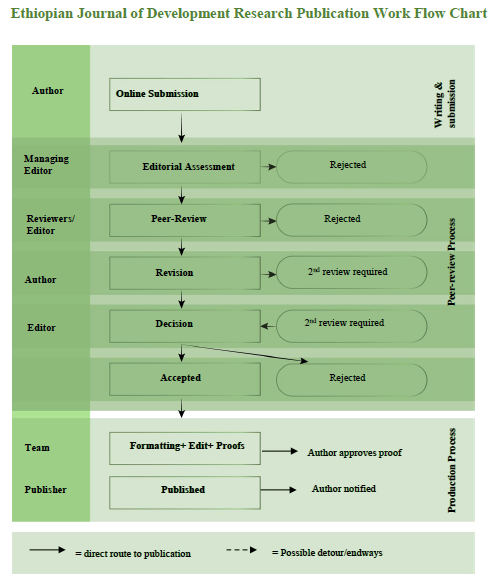Editorial Policy
- The Ethiopian Journal of Development Research (EJDR) is a bi-annual journal dedicated to serve as an avenue for sharing useful findings in the multi-disciplinary areas of development, focusing on Ethiopia in particular and the developing countries in general.
- EJDR publishes original peer-reviewed articles that navigate through wide areas and themes of development— such as rural development, urban development, their interfaces and linkages, national development, regional development (geographic); sectoral and firm-level growth and development (thematic scope); short-term growth, long-term development (time); institutions and governance; social, political, economic, environmental, etc dimensions, et cetera. EJDR also publishes short communiqués, synopses of big researches, dissertation abstracts, book reviews, and evidence-based commentaries, which may have both theoretical and empirical contents drawn using scientific methodological approaches. As such, it provides scholars, scientists and researchers in development research with an avenue for sharing and reflecting on research results about development in Ethiopia.
- Authors, reviewers and editors thus have the duty to ensure that articles submitted to EJDR contribute to scholarly dialogue on the economic, social, political and other related aspects of development in Ethiopia, and elsewhere. In addition to their scholarly quality, therefore, articles to be published in EJDR shall be selected on their potential to contribute to the growth of knowledge and academic debate.
- Priority is given to articles that deal with development practices, policies, strategies and institutions in Ethiopia. However, articles concerned with other development-related issues of the country and of other developing countries are also welcome for publication so long as they have scholarly merit.
- Every article submitted to EJDR shall be reviewed by at least two scholars of proven competence in the field. Where the two reviewers may give opposite recommendations, a third opinion is sought. In case, also the third reviewer remains indifferent, the Managing Editor has to take the issue to the attention of the Editor-in-Chief, who shall go through the reports of all the three reviewers, scan the article against those comments and then pass the final judicial decision on the fate of the article.
- However, the Editor-in-Chief makes the final regarding the fate of each article.
- Any article to be submitted to EJDR should be packaged in the required style and format and should be submitted to the Managing Editor at: ejdr.cds@aau.edu.et copied to ejdr.aau1974@gmail.com and negyon@yahoo.com.
- The responsibility for the views expressed in the articles that appear in EJDR is solely that of their authors, not of the editors or of the College of Development Studies, Addis Ababa University.
- Multiple authorship articles receive priority over sole-authored ones. Also articles that are based on time-sensitive/perishable data are given priority.
- EJDR does not accept articles and other contributions that have previously been published (be it in paper-based formats or Internet-based media, such as open-access journals) or are currently under review by other journals.
- Articles submitted for publication in the EJDR must conform to the technical requirements set out in the “Guide to Authors” and the “EJDR Style and Format”. It is not the editors’ responsibility to correct style, incomplete references or factual fallacies.
- In addition to the regular issues, CoDS may publish special issues of the EJDR that will be devoted to specific themes or programmes selected by the editors/the Editorial Board.
- All articles submitted to the EJDR will be acknowledged, and status communicated to authors, but those not accepted for publication will not be returned to the authors.
- Upon publication, authors of published articles will receive two copies of the particular issue and five off-prints of their articles.
- The copyright on all the contributions published in EJDR is retained by the College of Development Studies, Addis Ababa University.
- CoDS shall consider requests of authors to reprint their contributions elsewhere provided that the request is made in writing and the conditions stated in the copyright agreement are fulfilled.
- Plagiarism, including self-plagiarism and reproducing once-own work, is a serious academic dishonesty. And so are double submission, double publishing. CoDS does not tolerate any such offence. Committing such an offence shall entail litigations leading to a series of severe consequences, including loss of all rights resulting from the plagiarized work, compensations for the harm caused to the original sources, compensations for the image damage caused to EJDR and the costs incurred in producing and disseminating that particular issue of the Journal. Authors shall thus sign anti-plagiarism and anti- double submission declaration both at initial submission of articles and when they submit the final revised version of the article.
- For non-commercial purposes, such as research and teaching, articles can be reproduced and used with due acknowledgement.
- Authors are required to strictly adhere to the Editorial Policy of the Journal, “Notes to Authors and the EJDR Style Guide. Non-compliance can be a sufficient reason for rejection.


